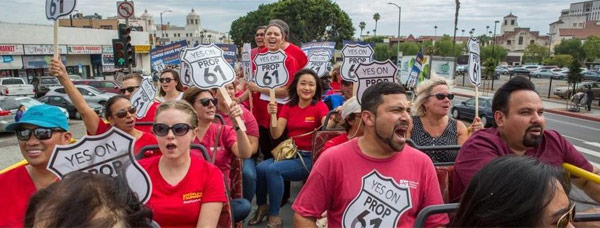News
Proposition 61 Will Help Reduce Outrageous Prescription Drug Prices

As public outrage has erupted over a 500 percent price increase for life-saving EpiPens and a $1,000-per-pill cost for the most effective hepatitis C treatment, the pharmaceutical industry appears to be beyond shame.
Even the price of generic drugs is skyrocketing; nearly 400 had increases of more than 1,000 percent the past seven years.
Transparency is not enough. It’s long past time to cut drug prices to rein in an arrogant drug cartel that will always put its profits above public health and safety.
Only one answer is available today – voting “yes” on Proposition 61.
Nurses see the fallout every day. Families who cannot afford the medications their children need face giving up other basics. We see diabetic patients in the hospital with elevated blood glucose levels because they couldn’t afford medication. And we see patients with hypertension who can’t afford their medications and are in crisis.
We pay by far the highest drug prices in the world, even though much of the research is not done by the drug companies but subsidized by taxpayers and conducted at public universities.
Why are we different? Big Pharma has spent $3.4 billion in federal lobbying since 1998, more than any other industry, to intimidate lawmakers and block any reforms. Our elected leaders are unable or unwilling to end pharmaceutical giants’ predatory pricing practices.
A modest California bill, Senate Bill 1010, would have simply required more notice of price hikes is the latest example. Yet, as a Sacramento Bee editorial explained, “the Legislature, shamelessly caving to Big Pharma’s money and lobbyists, maimed and then killed it.”
A similar fate has befallen every initiative in Congress, notably efforts to permit Medicare to negotiate bulk discount rates from Big Pharma, as Canada and other industrial countries have done.
One agency that does have that power is the Department of Veterans Affairs. That’s why Proposition 61 has adopted the common-sense approach of barring state agencies from paying more for prescription drugs than the prices paid by the VA, up to 40 percent less than paid by Medicare. It works for veterans, and will work for the rest of us.
To rub salt in the wound, our out-of-pocket costs for swollen drug charges goes into Big Pharma’s $90 million war chest to fight Proposition 61.
Drug company arguments boil down to a scare tactic, threatening to raise the prices for needed medications even more if Proposition 61 passes. But federal law caps the amount veterans can pay, and they’d need major insurers to agree to other ransom-like price hikes.
We can’t count on our lawmakers to act, but the people can. For our children, for our families, let’s tell Big Pharma, we’ve had enough.